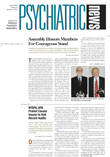Early intervention at the first sign of prodromal symptoms can prevent full relapse in people with schizophrenia, said Marvin Herz, M.D., in a lecture at APA’s 2003 Institute on Psychiatric Services in Boston in October.
Herz was the 2003 recipient of the American Psychiatric Foundation’s Alexander Gralnick, M.D., Award for Research in Schizophrenia, and his lecture was presented in connection with the award.
While the costs of outpatient intervention during the prodromal phase are not insignificant, the strategy has been shown to be cost-effective when considering overall costs—especially the costs of rehospitalization, which are avoided through prevention.
Herz, whose groundbreaking research on prodromal symptoms of relapse has informed APA’s treatment guideline for schizophrenia, provided an overview of prevention research in the last 20 years and outlined the problems and possibilities of early intervention.
The strategies he described entail the involvement of the family and the patient in recognizing early warning signs of relapse and an assertive outreach approach by the outpatient treatment team. He added that British psychiatrists and researchers have found success using cognitive-behavioral therapy to reduce the disabling effects of delusional thinking that may appear in the prodromal phase.
“We advocate continuing and ongoing collaboration with the family,” said Herz, a professor of psychiatry at the University of Miami School of Medicine and chair of APA’s work group that developed a practice guideline on the treatment of schizophrenia.
“We think these early-intervention strategies should be routine practice in outpatient services. And we need more research to refine and improve techniques of recognizing early warning signs and [to refine and improve] treatment strategies.
“Through these, we can reduce pain and suffering of patients and family members and maybe improve long-term outcome by reducing relapse. We need to find methods of improving coping skills [of families and patients]. With increased coping skills, you can help them deal more effectively with stress and recognize prodromal symptoms.”
Primary Prevention Elusive Goal
The notion of prevention—especially primary prevention—of a costly, extraordinarily disabling disease for which there is no cure is a tantalizing one.
As early as 1980, Herz and colleagues performed retrospective and prospective studies of patients with schizophrenia to determine the kinds of symptoms they experienced immediately prior to the onset of disease.
Symptoms that were identified include trouble sleeping and concentrating, depression, a feeling of being overwhelmed, tension, nervousness, and worry about impending doom.
Also prominent during the prodromal phase was the appearance of idiosyncratic behaviors: one patient might begin to pace obsessively while alone in his room; another patient might dress bizarrely.
Prevention of schizophrenia, however, is difficult for many reasons. Primary among these is that prodromal symptoms are not specific to schizophrenia. Many individuals who experience such symptoms may never go on to develop the disease, and the problem of false-positives plagues prevention efforts at both the primary and secondary levels.
Ethical issues surround efforts at primary prevention. “We don’t have the ability to say [that] this person will definitely develop schizophrenia,” Herz said. “It can lead to stigma, demoralizing individuals who may never get the disorder.”
Nonetheless, Herz cited research out of Australia aimed at identifying people at risk for first-episode schizophrenia in a community sample of 1,000 young people. The study appeared in the December 2002 American Journal of Medical Genetics.
Sixteen individuals were identified on the basis of prodromal symptoms and given stress-management training and low-dose antipsychotics. The researchers found the incidence of schizophrenia in the community sample was significantly lower after the intervention than before.
Herz said the study was not controlled and was limited by the problem of false-positives. Still, he called the research promising, laying the groundwork for future primary-prevention efforts.
Secondary Prevention Promising
Herz’s recent work has focused on the use of secondary prevention strategies to avoid relapse in patients who have been hospitalized and treated for the disease previously.
He said the relationship between prodromal symptoms and true relapse is not a simple, mechanistic one, but a complex, dynamic one involving stressful life events, the patient’s coping skills and personality traits, and the support and coping skills of the family.
In a study by Herz and colleagues published in the March 2000 Archives of General Psychiatry, 82 outpatients with schizophrenia or schizoaffective disorder diagnosed with DSM-III-R criteria were randomly assigned to receive either a program for prevention of relapse (experimental group, 41 subjects) or treatment as usual (control group, 41 subjects). Patients in both groups were prescribed standard doses of maintenance antipsychotic medication.
The program for prevention of relapse consisted of a combination of psychoeducation, active monitoring for prodromal symptoms with clinical intervention when such symptoms occurred, weekly group therapy for patients, and multifamily groups. The treatment-as-usual group received biweekly individual supportive therapy and medication management.
After 18 months, 17 percent of the patients in the experimental group had experienced relapse, compared with 34 percent in the control group. Twenty-two percent of the experimental group had to be rehospitalized, compared with 39 percent in the treatment-as-usual group.
During his lecture at the institute, Herz said the ambulatory care costs in the experimental group were higher—as expected—but the overall costs were lower than those of the treatment-as-usual group.
“Good treatment doesn’t have to cost more,” he said. “It can cost less.”
An abstract of “Prediction and Prevention of Transition to Psychosis in Young People at Incipient Risk for Schizophrenia” is posted on the Web at www.ncbi.nlm.nih.gov/entrez/query.fcgi?cmd=Retrieve&db=PubMed&list_uids=12457389&dopt. An abstract of “A Program for Relapse Prevention in Schizophrenia” is posted at http://archpsyc.ama-assn.org/cgi/content/abstract/57/3/277. ▪
Arch Gen Psychiatry 2000 57 277

